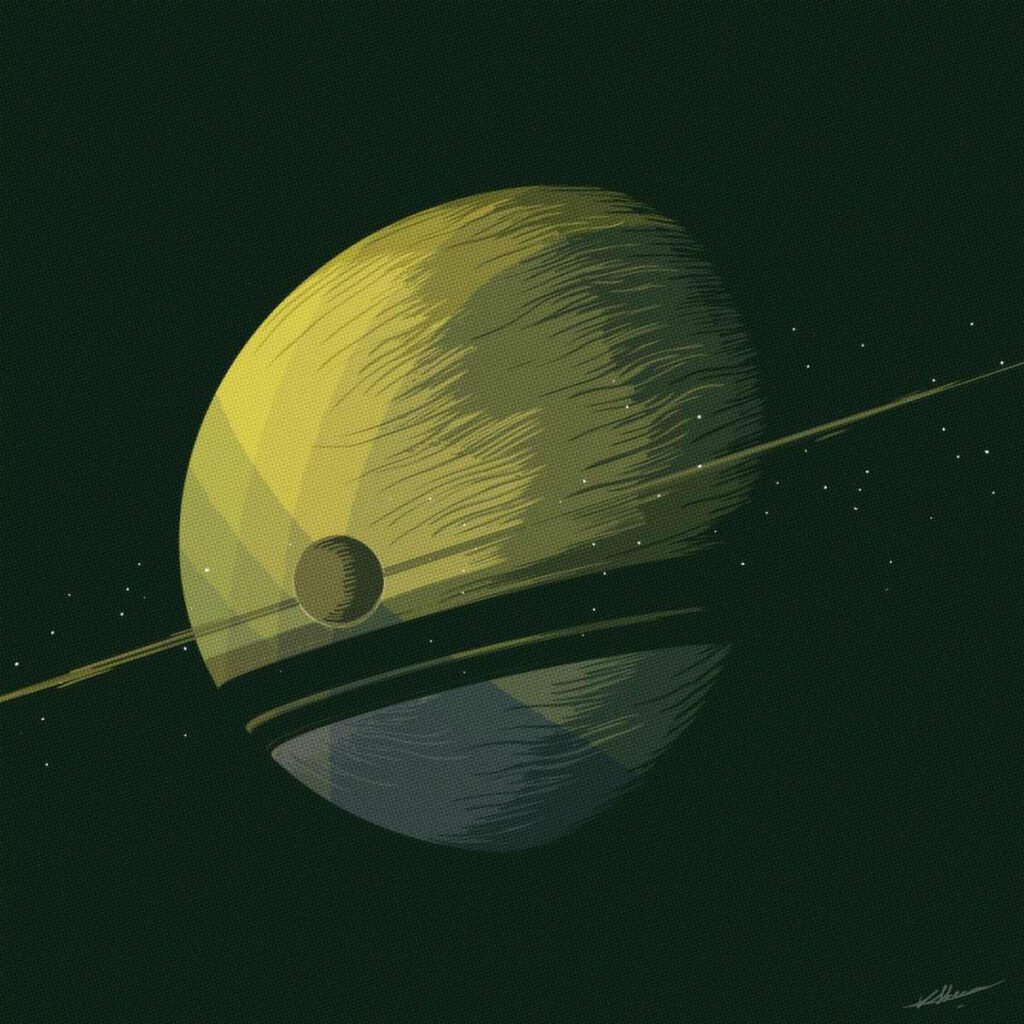Editor’s note: This is a continuation of a story Roger was working on when he passed away. This ending is one of many we received. To read Roger’s beginning to the story, from the end of which each entry picks up the thread, go here. Illustration by Krishna Bala Shenoi. This is one of four endings we’re posting this week. Vote on this week’s endings here.
Rick Norwood writes:
Alex looked up from his shoebox of punchcards. “You told us a science fiction story, Regan. Now let me tell you one. There are a bunch of highly intelligent molecules on Titan and they’re looking at us right now with telescopes.”
“Through the roof?” Mason asked.
“Yeah. Why not. They’ve got x-ray telescopes. Only they don’t think we’re interesting, because they don’t think that anything so gross, anything made up of so many molecules all lumped together, can possibly be intelligent. But the beer glasses,” he tossed off the last of his beer and wiggled the glass in the air for more, “the beer glasses form these fascinating patterns. Just look at the rings they leave on the table, pure water droplets, organized in perfect circles. So the Titans…”
“Titanium Man,” interrupted Claire.
“Molecule Man,” Mason came back.
“Shut up. Who’s telling this story, you or me? Anyway, the people on Titan think we’re just blobs and the true intelligence on the planet consists entirely of beer.”
“Alex, that sounds like a third season Star Trek episode,” said Elliot.
“Regan’s idea is actually possible,” said Mason. “Nature forms all sorts of patterns without intelligence. Look at snowflakes. Look at the planet Saturn itself, with its rings.”
“You know what’s sad?” Claire put in. “Your molecules on Titan are sealed off under that layer of dirty ice. They can never see Saturn’s rings.”
“Why assume they’re not intelligent?” asked Mason. “You’ve led them through all the stages of evolution, up to the stage of molecular life. Why not give evolution a few more million years to work. The Molecules of Titan form cells. Then, just like on earth, after a billion years or so the cells learn to cooperate, and form slime mold.”
“I love it,” Elliot said. “‘The Slime Mold of Titan’. Talk about bad third season Star Trek.”
Mason ignored him. “Then, after more millions of years of evolution, they develop an exoskeleton, and settle down to become multi-cellular life. Trilobites. Lungfish. Well, not lungfish on Titan, but some higher form of life.”
“Higher by whose standards?” asked Regan.
“Different, then. More evolved. Maybe we’re listening to a symphony orchestra playing, somewhere in the ice magma. I realize they’re not making actual sounds, but why couldn’t they have evolved to ‘hear’ radio waves?”
Clair said, “Maybe they see electromagnetic waves, in a frequency that can penetrate the ice cover. Regan, you said you think the Titan lander moved. That could mean that the ice is very thin there. Maybe the beings on Titan can see the lander through the ice, and are singing to it.’
“They think it’s a god,” said Elliot. “They’re singing hymns of praise. To us.”
“To beer,” put in Alex.
“Why assume they’re less advanced than we are?” asked Mason. “Maybe they know perfectly well what a spacecraft is, and are welcoming us to the club.”
“Play the music again,” Claire said.
Regan obliged, and for a brief time all five of them were silent. Then the waitress brought Alex his beer, and they all began to talk at once.
Mason held up a hand for attention. “Regan, I assume you are already running the pattern recognition program on this signal.”
“Of course, but people are better at pattern recognition than computers,” Regan said.
“Are not!” said Alex, who was feeling put out at the rejection of his idea, which he still thought was very clever, and who was just drunk enough to want to pick a fight.
“Of course human beings are better at pattern recognition than computers,” said Regan. “Speech is a pattern. Look how bad computers are at recognizing human speech. Have you ever gotten into a telephone conversation with one of those programs that tries to talk to you.”
Everyone nodded, for a moment united by a shared human experience.
“I better get back to the lab.” Regan looked over at Claire, “Unless you want to tell us your science fiction story.” Clair hesitated, then shook her head.
Regan pushed back her chair and took a five dollar bill from her purse. “That should cover my tab.”
A very loud boom shook the building, and everybody jumped. It was followed by the rattle of rain.
“Looks like Mother Nature wants you to have another beer,” said Alex.
Regan sat back down.
Claire said, “Since we’re trapped here for a while, I’ll tell my story about the Titanians after all. I like Regan’s idea of a molecular life form. All life on earth is built up out of cells, and inside of every cell is a double helix of DNA. Or, to put it another way, the cell is built up around the DNA molecule, by the DNA molecule. DNA molecules are built by cells for their own protection. The molecule came first. Nobody knows quite how. One of life’s great mysteries.
“Titan is much colder than Earth. Maybe the icy magma seas of Titan were a quieter, calmer place for life to begin. Maybe the molecules of Titan didn’t need cells for protection, so they stayed molecules.
“But Regan, why assume they aren’t intelligent? You seem to think they’re just blinking on and off like lightening bugs. Suppose what passes for DNA on Titan continued to evolve without cells. Picture it. DNA growing larger and larger, sending out branches.”
“The DNA Monsters of Titan!” said (who else) Elliot.
“They don’t necessarily have to be big,” Claire said patiently. “DNA is, what? I think I read that human chromosome number one has hundreds of millions of base pairs and is almost a centimeter long. Of course, that’s only if it were stretched out, instead of all raveled up like a tangle of yarn. So, I picture my Titanians as a wild ball of yarn only a few centimeters in diameter, but made up of one big DNA molecule that just kept on evolving. We have muscles and nerves, they have branches of DNA that act like tentacles. We have neurons in our brains, they think with their DNA. Intelligent mono-molecular life.
“So, our spacecraft lands. The branch of their DNA that acts as a sense organ recognizes it for what it is. And they send a reply. ‘Hello, new kid on the block.'”
Everyone was quiet. It was an interesting picture, something they had never thought of before.
Alex broke the spell. “The rain has stopped.”
“Then I better get back to work,” said Regan.
“Looking for patterns,” said Mason.
“No,” said Regan. “Before I was going to look for patterns. Clair changed my mind. Now I’m going to look for a message.”











